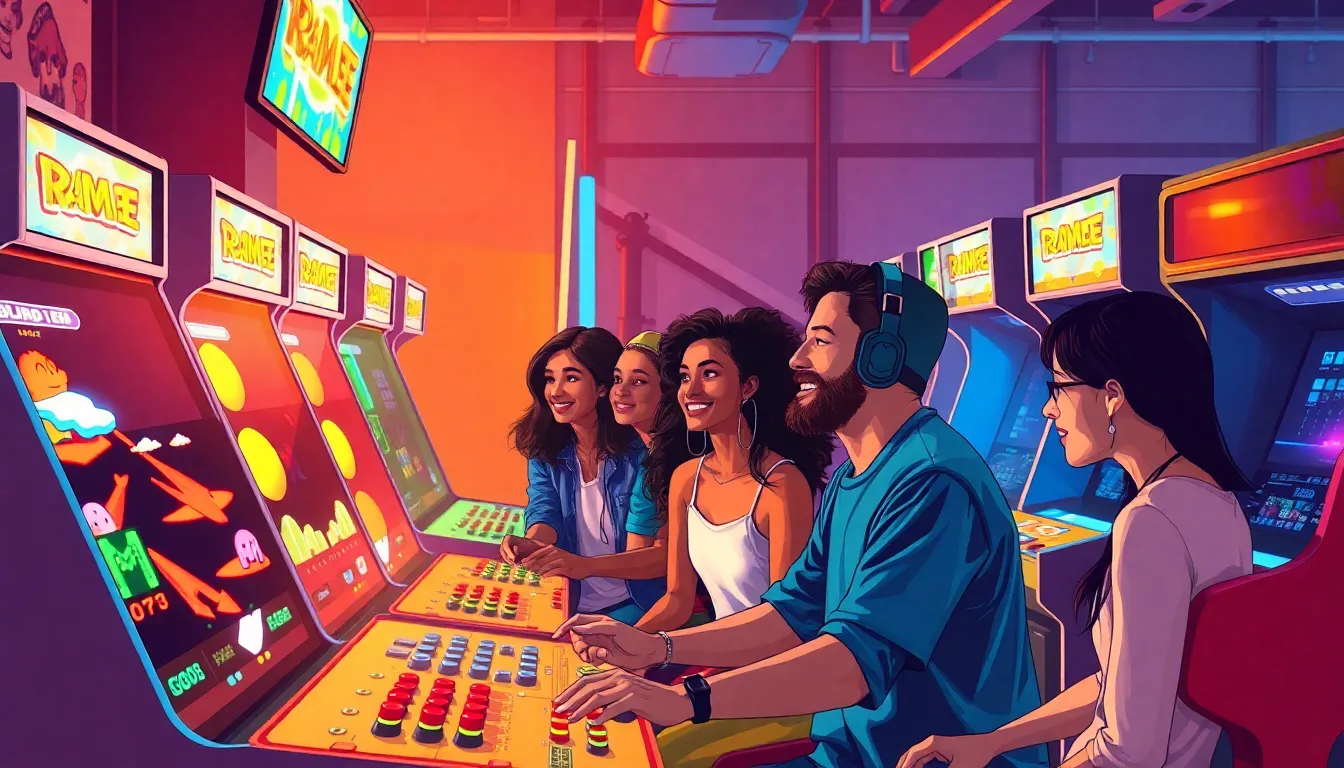
Video Game Culture: How It Connects, Inspires, and Transforms Lives Worldwide
In a world where “just one more level” can lead to hours of epic adventures, video game culture has become a vibrant tapestry of creativity, community, and competition. It’s not just about pixels on a screen; it’s a lifestyle that unites players across the globe. From casual gamers to esports champions, everyone finds their niche in this digital playground.
Video Game Culture
Video game culture encompasses a diverse range of experiences and interactions within the gaming community. Shared experiences connect players globally, whether through online multiplayer games, streaming platforms, or in-person events such as conventions. Gamers engage in discussions about game mechanics and narrative structures while forming relationships with like-minded individuals.
Inclusivity plays a crucial role in the community, welcoming people of various backgrounds and identities. Many gamers participate in forums and social media platforms to share insights and promotions. They find support through guilds and clans, fostering camaraderie among players.
The competitive aspect of gaming drives the emergence of esports. Tournaments like the League of Legends World Championship and The International attract millions of viewers and substantial sponsorships, underscoring the growth of competitive play. Players aspire to reach the professional level, while fans engage through viewership, creating a vibrant community.
Creativity thrives in this culture as well. Fan art, cosplay, and mods showcase players’ talents and enhance the gaming experience. Events like Game Jams encourage developers to collaborate and innovate, resulting in unique games and concepts.
Educational initiatives increasingly incorporate gaming. Institutions utilize games to teach problem-solving, teamwork, and critical thinking. Such programs demonstrate the potential of video games beyond entertainment, highlighting their value in various fields.
Overall, video game culture represents a dynamic ecosystem where creativity, community, and competition coexist, enriching the lives of countless individuals worldwide.
Historical Context

Video game culture has deep roots, tracing back to the early developments in gaming technology and industry. Understanding this historical background is crucial for appreciating its current significance.
Origins of Video Games
Beginning in the 1950s and 1960s, video games emerged as simple computer programs designed for entertainment. Early examples include “Tennis for Two,” created in 1958, and “Spacewar!,” launched in 1962. These pioneering games utilized basic graphics and controls, serving as foundational experiences for players. The 1970s saw further advancements with arcade machines. “Pong,” released in 1972 by Atari, revolutionized gaming, introducing a wider audience to interactive entertainment. The introduction of home consoles like the Magnavox Odyssey in 1972 expanded accessibility, setting the stage for future growth.
Evolution Through the Decades
The 1980s marked a significant turning point in the evolution of video games. The popularity of home computers and consoles led to the gaming industry boom. Iconic titles like “Pac-Man” and “Super Mario Bros.” captivated audiences, establishing franchises that endure today. The 1990s introduced 3D graphics and online gaming, creating immersive experiences. Games like “Doom” and “Final Fantasy VII” pushed technological boundaries. In the 2000s, the rise of multiplayer online games and esports changed the landscape. Titles such as “World of Warcraft” and “League of Legends” fostered competitive gaming communities. Each decade brought innovations, shaping video game culture into a diverse and dynamic phenomenon that connects fans worldwide.
Key Elements of Video Game Culture
Video game culture thrives on community, creativity, and competition. It brings together diverse individuals through shared interests and experiences.
Community Engagement
Engagement in gaming extends beyond mere play. Gamers create online forums for discussions, sharing strategies, and forming friendships. Platforms like Discord facilitate real-time communication, enhancing collaboration among players. Social media serves as a vital tool, with influencers connecting with audiences, discussing game mechanics, and promoting inclusivity. Events such as charity streams showcase community efforts, emphasizing collective impact. Players gather for game nights, whether online or in-person, forming strong bonds over shared experiences. This sense of belonging is crucial, as it transforms gaming into a social phenomenon that transcends boundaries.
Gaming Events and Conventions
Events and conventions play an essential role in video game culture. Major gatherings such as E3 and PAX attract thousands of attendees, bringing together fans, developers, and industry professionals. Exhibitors showcase upcoming titles, allowing attendees to experience new games firsthand. Networking opportunities arise, enabling indie developers to connect with publishers. Additionally, panels featuring key figures provide insights into game development and future trends. Cosplay contests celebrate creativity, with fans dressing as their favorite characters, further enhancing the communal atmosphere. The excitement these events generate fosters a stronger sense of community among gamers, encouraging collaboration and innovation.
Impact on Society
Video game culture significantly influences society across various domains, reshaping perceptions and interactions worldwide.
Influence on Art and Media
Video games inspire numerous artistic expressions, including visual art, music, and storytelling. The vibrant worlds and characters within games often translate into stunning fan art and detailed cosplay. Noteworthy game soundtracks have transcended their medium, with orchestras performing music from popular titles at worldwide events. Game design itself embodies artistic innovation, combining graphics with interactive narratives that engage audiences. Iconic titles frequently serve as sources for films and animated series, showcasing the cultural relevance of gaming in broader media. Creative collaboration during events like Game Jams reflects the symbiotic relationship between gaming and the arts, fostering new ideas and artistic ventures.
Social Interaction and Relationships
Gaming creates unique avenues for social interaction and relationship-building among players. Online multiplayer experiences foster friendships across geographic boundaries, as players team up or compete against one another. Platforms like Discord and Twitch enhance communication, allowing gamers to share strategies, celebrate successes, and connect personally. In-person events such as conventions provide opportunities to meet fellow enthusiasts and industry professionals, reinforcing bonds formed through gaming. Shared experiences during gameplay and community events also promote inclusivity, welcoming individuals with varied backgrounds and interests into a shared passion. Ultimately, video game culture acts as a catalyst for forming lasting connections and diverse communities.
Current Trends in Video Game Culture
Video game culture continues to evolve, showcasing new trends that shape player experiences and community interactions.
Streaming and E-Sports
Streaming platforms like Twitch and YouTube Gaming dominate the landscape, providing players avenues to showcase skills and engage with audiences. E-sports tournaments, featuring popular games such as “League of Legends” and “Dota 2,” attract millions of viewers and generate substantial revenue through sponsorships and merchandise. Players often aim for professional status, building careers through competitions and live streaming. Major events like The International and League of Legends World Championship captivate global audiences, highlighting the rise of e-sports as a legitimate career. Viewers connect with their favorite players, fostering a sense of community and supporting content creation.
Inclusivity and Diversity
Inclusivity has become a cornerstone of video game culture, welcoming diverse voices and experiences. Game developers increasingly prioritize representation, creating characters and narratives that resonate with players from various backgrounds. Gamers actively participate in forums and communities that celebrate this diversity, fostering relationships across different demographics. Events such as the Queer Games Bundle and Black Game Awards highlight the importance of visibility in gaming. These initiatives not only elevate underrepresented voices but also promote accessibility, ensuring that gaming experiences cater to all players. Diverse gaming communities thrive, encouraging collaboration and shared enjoyment.
Conclusion
Video game culture continues to thrive as a multifaceted phenomenon that unites individuals across the globe. Its blend of creativity community and competition fosters an environment where players can express themselves and build meaningful connections.
As the gaming landscape evolves technological advancements and cultural shifts will further shape this vibrant ecosystem. The ongoing emphasis on inclusivity and representation ensures that video games remain a welcoming space for everyone.
With each new development in gaming players can look forward to an enriched experience that transcends mere entertainment and impacts society positively.
